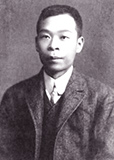
張福興(1888-1954),音樂家。出生於苗栗頭份。五歲時無師自通,學會胡琴。國語學校師範部表現優異,得公費留學日本,學習西洋音樂。1910年畢業於東京音樂學校。回臺後,致力於音樂教育的傳播、推廣,並採集民謠、跨足勝利唱片之流行音樂製作。1922年,張福興奉派前往日月潭周邊水社採集原住民音樂,其後出版《水社化番的杵音與歌謠》,可謂臺灣人最早的原住民音樂田野採譜。1924年發行的漢族民間音樂樂譜《女告狀》,更被譽為臺灣第一本工尺譜與五線譜對照之曲譜,對於漢族音樂推廣與傳承,功不可沒。1948-1954踏入宗教音樂領域,著手採集佛曲,為他的晚年生活帶來恬淡及安定,1954年病逝於臺北。他對音樂教育的推廣、原住民及漢族音樂採集的貢獻,擁有「臺灣近代第一位音樂家」美譽,實至名歸。
ZHANG Fu-Xing was born in Toufen, Miaoli in 1888. He taught himself to play the erhu (Chinese fiddle) at the age of five. He received a scholarship from the government to study Western classical music in Japan. After returning to Taiwan, he devoted the rest of his life to music education. Zhang also collected folk songs and produced popular music. One of his most important works include a collection of several dozen Aboriginal songs called “Traditional Songs and Pestle Songs of the Thao at Sun Moon Lake,” which was published in 1922. It was the first time Aboriginal music in Taiwan was recorded using transcriptions from fieldwork. His other major work was a collection that used both gongche notation and the staff of Western musical notation for various versions of a folk tune popular at the time called “A Sing-Song Girl’s Story.” Zhang’s achievements in promoting Chinese music are incomparable. He has been called “the first Taiwanese musician of the modern era.” Zhang died in Taipei in 1954.
